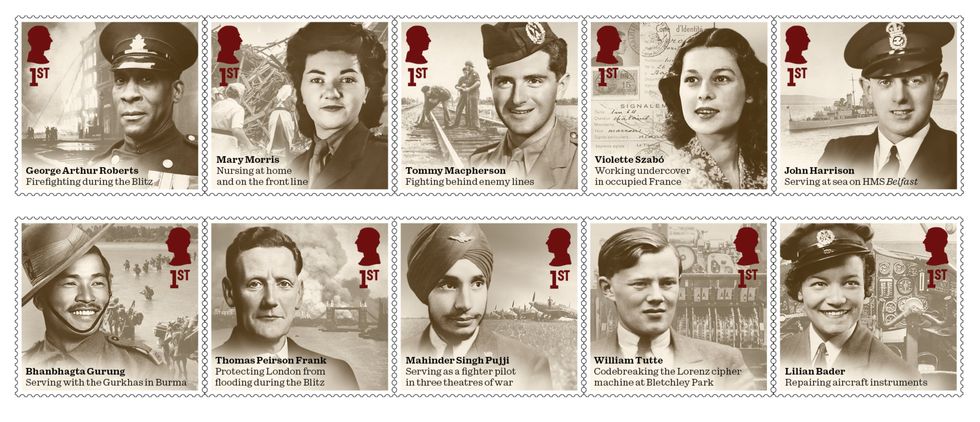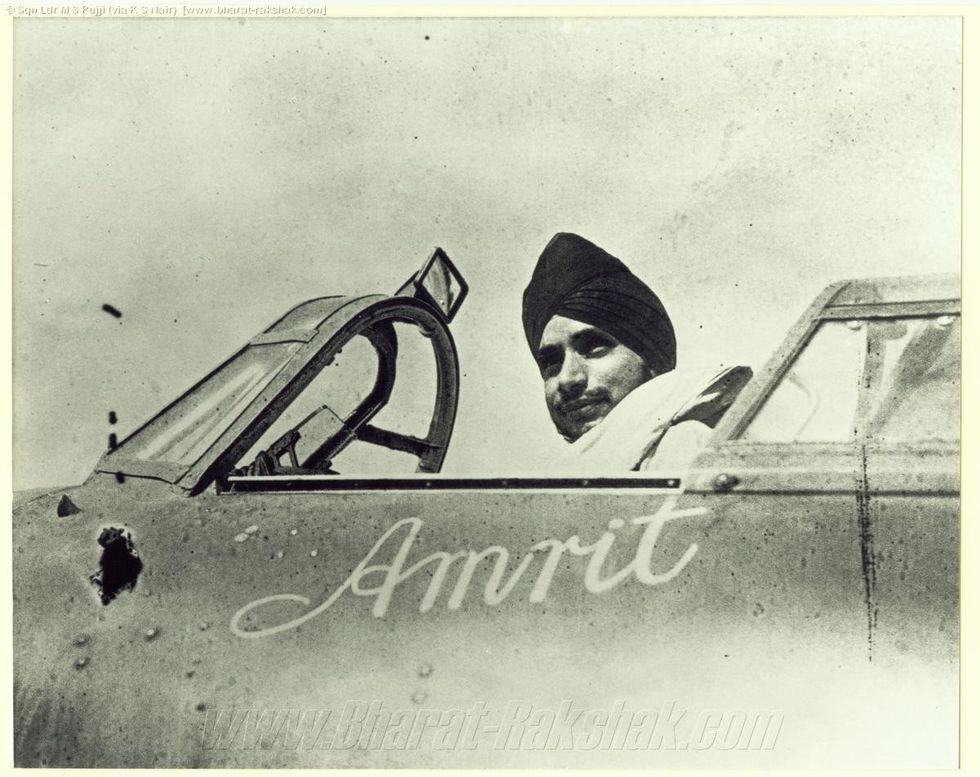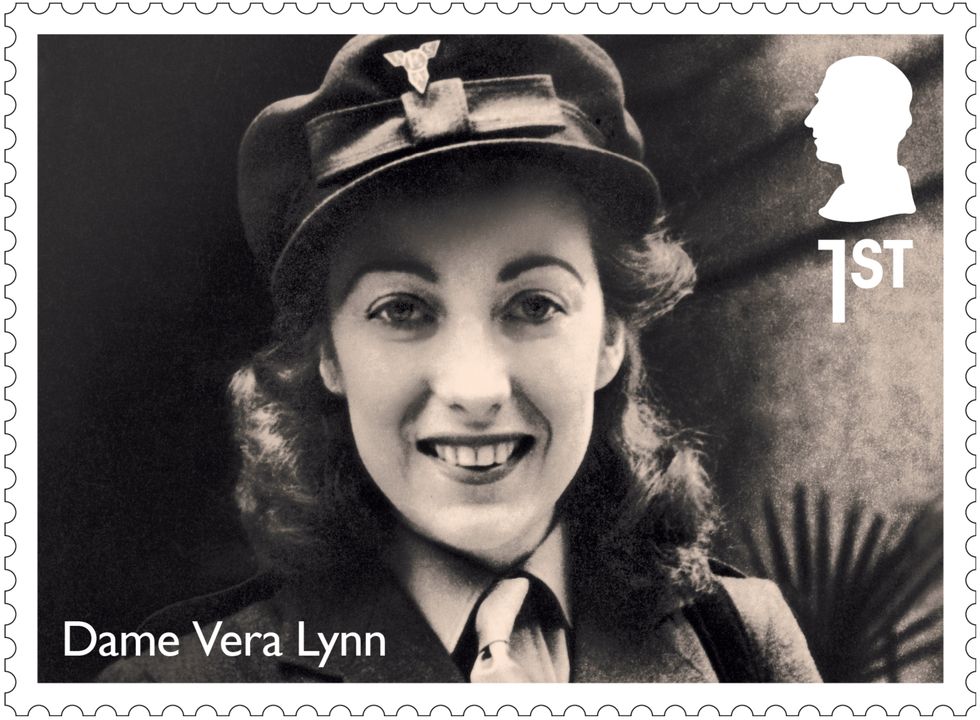ROYAL MAIL is issuing 10 new stamps to mark the 80th anniversary of VE Day (Victory in Europe Day) next Thursday (8) to “honour men and women who made extraordinary contributions during the Second World War”.
Paying tribute to the Indian war effort, Royal Mail has included ace fight pilot Mahinder Singh Pujji (1918-2010), who “was awarded the Distinguished Flying Cross for his outstanding courage and leadership”. Pujji, who was born in the British summer capital of Simla (presentday Shimla), “was a pilot and Squadron Leader with the Royal Air Force (RAF) and Indian Air Force, who fought in Europe, the Middle East and Southeast Asia,” according to Royal Mail.
“Training as a pilot in the 1930s, he volunteered for service with the RAF, arriving in Britain in 1940. Flying both Hurricanes and Spitfires, Singh Pujji was involved in many dogfights with Luftwaffe pilots and was forced down twice. He eventually settled in London and worked as an air-traffic controller at Heathrow Airport.”
The London-based historian, Kusoom Vadgama, expressed her delight that the contribution of India, while a British colony, was being recognised.
Pujji’s name was familiar to her, she told Eastern Eye.
“It’s wonderful,” she added.
“What would Britain have done without India?” quipped Vadgama, 92, who was probably the first contemporary historian in the UK to write about the Indian contribution in the two world wars with any kind of depth.

In the face of a German onslaught, Britain, short of fighter pilots, looked to India in its hour of need in 1940.
Pujji, who was born in Simla on August 14, 1918, took up flying as a hobby with the Delhi Flying Club in 1936. He was among a group of 24 promising trainee pilots, who were recruited by the RAF in India and brought over to the UK for training, before being inducted to fly combat missions.
By 1941, at the age of 23, Pujji was flying Hurricanes and Spitfires for the RAF.
He found that wearing his dashing RAF uniform, proudly with turban – for which he was given special clearance – made him a heroic figure in English society.
“When I was in England during the war, I was treated very well indeed,” he once said. “I had my own driver and petrol was paid for. When I went to the cinema, I used to get in the queue with everyone else, but people would insist that I got to the front of the queue – I think it must have been my uniform. I would get to the front of the queue and try to pay for my ticket, but was let in free. Similar things happened at restaurants in the village; often the owners would not take payment for a meal. I never felt different or an outsider. I was made to feel very much at home by everyone I met.”
Since he did not eat beef, his rations included extra chocolate. In Africa, where he once had to crash-land in the desert and was lucky to be rescued, he was allowed to fly weekly to Cairo so that he could have a proper meal.
Many were his tales of derring-do. On one occasion, his aircraft was disabled over the English Channel by a German Messerschmitt Bf 109, but he crash-landed near the White Cliffs of Dover. He was rescued from the burning wreckage and, after a week in hospital, returned to duty.
When he was given his Distinguished Flying Cross in 1945, there was a personal letter of congratulations from Air Chief Marshal Sir Keith Park, along with a citation which read: “This officer has flown on many reconnaissance sorties over Japanese occupied territory, often in adverse monsoon weather. He has obtained much valuable information on enemy troop movements and dispositions, which enabled an air offensive to be maintained against the Japanese troops throughout the monsoon. Flight Lieutenant Pujji has shown himself to be a skilful and determined pilot who has always displayed outstanding leadership and courage.”
The veteran aviation, maritime and military historian, KS Nair, met Pujji and wrote about his importance in the British Indian context.
“In recent years, the British have been re-discovering the contribution of ethnic minorities, particularly to their victory in the Second World War,” Nair observed.
“For decades, their war histories painted a picture of Britain ‘standing alone’ for the first two years of the war, until the Americans joined them following the Japanese attack upon Pearl Harbour in December 1941.
“Today, with growing numbers of voters from first- and second-generation immigrant communities, and, perhaps owing something to a belated sense of fair play, British politicians, journalists and historians have begun to recognise and retell the stories of some of the many people of non-European origin who served under their flag during the Second World War.
“Among this material and among these stories, there often appears one Indian pilot in particular: Squadron Leader Mahender Singh Pujji, DFC. He has in many ways become, in the UK, the visible face of the Indian contribution to the war effort.”
After the war, he returned to India and was employed as an aerodrome officer at Safdarjung Aerodrome, Delhi. He emigrated to the UK in 1974, moved to the US to be manager of a pizza retail chain, before returning to England in 1984 and settling in East Ham, and in 1998 retiring to Gravesend, Kent.
He believed war films presented a “white-only view of the RAF” and campaigned to raise awareness of India’s largely ignored contribution to the British war effort.
In 2005, Pujji protested against the British National Party’s symbolic use of a Spitfire in their political campaign literature.

“The BNP are wrong to use the Spitfire as representative of their party,” he declared. “They forget people from different backgrounds helped in the Second World War. I am proof of this – I was flying a Spitfire. I also met Winston Churchill. Even in those days, there were ethnic minorities fighting for the British. I would recommend the armed forces for young people, regardless of race.”
In 2009, he noted he had received no invitations to any of the many commemorative events in Britain that marked the 70th anniversary of the outbreak of the Second World War, or any other year.
“I remember my dead friends all the time,” he told the BBC. “I have photographs with me where I marked crosses over the pilots we lost.”
He and his wife Amrit Kaul, who were married in 1944, had two daughters and a son. Pujji died of a stroke at Darent Valley Hospital on September 18, 2010, aged 92. He left behind his children, seven grandchildren and five great-grandchildren. Gravesham Borough Council celebrated his life and heroism with an exhibition.

A statue of Pujji, by English sculptor Douglas Jennings, was unveiled by Air Vice-Marshal Edward Stringer in St Andrew’s Gardens, Gravesend, on November 28, 2014. The Gravesend community, which has one of the largest gurdwaras in the UK, raised £70,000 for the statue in a month. It bears the inscription: “To commemorate those from around the world who served alongside Britain in all conflicts 1914-2014”.
Among the 10 new stamps is one to remember Havildar (Sergeant) Bhanbhagta Gurung (1921–2008), from Nepal, who was “awarded the Victoria Cross while serving as a Rifleman in the 2nd Gurkha Rifles in Burma, now Myanmar, in 1945.”
The other stamps honour George Arthur Roberts (born in Trinidad and the first black man to join the London Auxiliary Fire Service), Mary Morris (nurse), Tommy Macpherson (commando), Violette Szabó (Special Operations Executive), John Harrison (ordnance officer), Thomas Peirson Frank (civil engineer), William Tutte (codebreaker) and Lilian Bader (instrument repairer).
The forces’ sweetheart, Dame Vera Lynn, merits a separate set of four stamps.






 Apsana Begum
Apsana Begum











